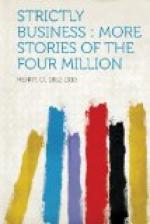“In that purse,” said Annie decidedly, “is exactly $11.85. I shall take every cent of it to-morrow and give it to professor Cherubusco, the greatest man in the world.”
“Well,” said Thomas, “I guess he must be a pretty fly guy to pipe off things the way he does. I’m glad his spooks told him where you could find me. If you’ll give me his address, some day I’ll go up there, myself, and shake his hand.”
Presently Thomas moved tentatively in his seat, and thoughtfully felt an abrasion or two on his knees and his elbows.
“Say, Annie,” said he confidentially, maybe it’s one of the last dreams of booze, but I’ve a kind of a recollection of riding in an automobile with a swell guy that took me to a house full of eagles and arc lights. He fed me on biscuits and hot air, and then kicked me down the front steps. If it was the d t’s, why am I so sore?”
“Shut up, you fool,” said Annie.
“If I could find that funny guy’s house,” said Thomas, in conclusion, “I’d go up there some day and punch his nose for him.”
VI
THE POET AND THE PEASANT
The other day a poet friend of mine, who has lived in close communion with nature all his life, wrote a poem and took it to an editor.
It was a living pastoral, full of the genuine breath of the fields, the song of birds, and the pleasant chatter of trickling streams.
When the poet called again to see about it, with hopes of a beefsteak dinner in his heart, it was handed back to him with the comment:
“Too artificial.”
Several of us met over spaghetti and Dutchess County chianti, and swallowed indignation with slippery forkfuls.
And there we dug a pit for the editor. With us was Conant, a well-arrived writer of fiction—a man who had trod on asphalt all his life, and who had never looked upon bucolic scenes except with sensations of disgust from the windows of express trains.
Conant wrote a poem and called it “The Doe and the Brook.” It was a fine specimen of the kind of work you would expect from a poet who had strayed with Amaryllis only as far as the florist’s windows, and whose sole ornithological discussion had been carried on with a waiter. Conant signed this poem, and we sent it to the same editor.
But this has very little to do with the story.
Just as the editor was reading the first line of the poem, on the next morning, a being stumbled off the West Shore ferryboat, and loped slowly up Forty-second Street.




